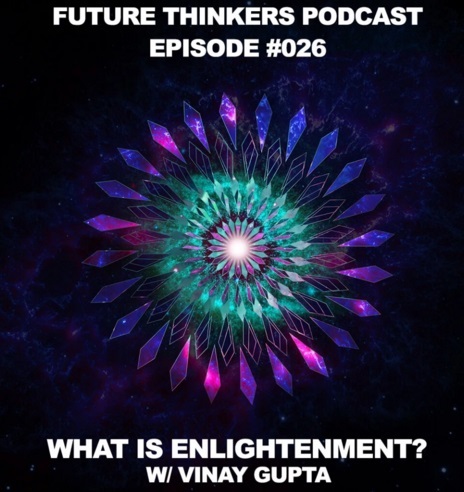We first interviewed Vinay Gupta on Future Thinkers Podcast a year ago. It was stimulating conversation about a wide variety of topics, including Ethereum, basic human needs, and space colonization. But the topic that caught our interest the most, and one we have since gotten a lot of comments on, is that of enlightenment.
The man claims to be enlightened, and I am inclined to believe him. It’s is a fascinating subject, so we invited Vinay on the podcast again to talk specifically about this. This time, our conversation lasted 4.5 hours and blew our minds yet again. We had to separate it into several episodes to make it more digestible. This is the first part of this new interview, making it Part 3 of the total Vinay Gupta saga (Listen to part 4 and part 5 here).
What is Enlightenment?
Ancient esoteric traditions describe enlightenment as a permanent transformation of consciousness, which allows one to see things how they really are. An awakening.
Enlightenment is a bit of a slippery topic. On one hand, the transformation of consciousness is an experience that people have talked about for thousands of years. It has been documented in many ancient written and oral traditions. To many esoteric spiritual schools, enlightenment is not just real. It is a central theme or even the main goal – for example, in Buddhism and Hinduism.
On the other hand, a transformation of consciousness is a subjective experience, and is something that can be difficult to measure in conventional ways. We can use self-reporting, but people’s own biases tend to muddle the results. From a scientific perspective, what we can do is measure the outward effects of it – brain activity, heart rate, response to different stimuli, behavior.
Studying Consciousness, Meditation, and Enlightenment
We have now seen many scientific studies on meditation. The studies showed a drastic differences in the types of brain activity in meditators and non-meditators. Scientists have also been able to measure the results of meditation. There is clear evidence that meditation increases self-awareness and self-control, improves physical and mental well-being, deepens our empathy towards others, and even increases neuroplasticity in the brain.
But enlightenment is a rare beast, and we don’t have so much data on it – at least not yet. Not many people claim to be enlightened, and out of those who do, not all of them may actually be enlightened.
Some people are skeptical that enlightenment exists at all. After all, few people have experienced it, and those that have sometimes describe it in different ways.
And that is another thing that makes the study of the subject tricky.
Misconceptions About Enlightenment
There are many misconceptions and myths surrounding it. Being an ancient practice, the enlightenment tradition has collected a lot of mythological baggage over the millennia. Much of the mythology surrounding the transformation of consciousness is pre-scientific, and wrapped up in cultural and historical biases. And those myths and biases keep getting passed down from teachers to students.
To bring enlightenment into the modern age, we have to scrape the mythology off it.
And this is what we talk about in the first part of this interview with Vinay Gupta. He goes into detail explaining what enlightenment is and what is isn’t, how it relates to modern science, and which aspects of the tradition need to be dropped to make it useful to us today.
In this episode:
What is enlightenment, and what isn’t?
Is enlightened consciousness better than ordinary consciousness?
Why the modern version of “law of attraction” misses an important point
Dismantling the mythology of enlightenment
Do psychedelic play a role?
Why we need to document and study enlightenment scientifically
Quotes From This Episode:
“Once you start drilling away at the deep structure of the mind, once you see a little bit of light on the other side, you’re more or less compelled to finish the job.”
“I would argue that the enlightened state is the natural state of human beings. We more or less start enlightened. And then we create the un-enlightened state of being as a special purpose experience, much in the same way that you might go into a movie theatre.”
“I think it’s really important that people don’t say, ”ordinary consciousness is crap, we’re going to go out there and find enlightened consciousness”. Ordinary consciousness is better for nearly all people, nearly all the time.”
“You can have the enlightenment experience while remaining in a condition of rational scientific doubt.”
